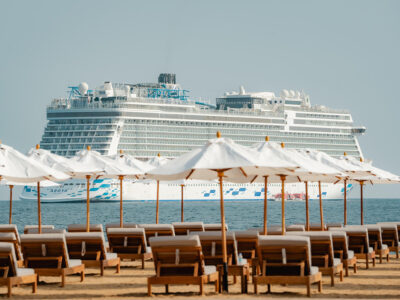Caterer investigates the region’s latest dining trends as consumers demand less fuss, more flavour and better value when it comes to eating out.
With the saturation of quick-service restaurants and glitzy gourmet food and beverage outlets on offer in Dubai, new trends indicate that consumers are now favouring a “smart/casual” dining concept according to the Middle East’s catering professionals.
The smart/casual dining sector has experienced global growth in the last year – especially in the Middle East with the help of the booming franchise market, explains Stephen Grey, general manager and head taster of The Taste Department.
Simple food is not easy food. People think it is, but you actually have to make it taste great, it’s very misunderstood.
“Consumer preferences are shifting from quick-service restaurants to a more casual experience rapidly.
“Customers want quality, healthy, organic, trans-fat-free, freshly prepared food with strong flavours, served in an outlet with a good ambience.”
Other essential prerequisites for today’s diners include innovative and flexible menu options with affordable prices says Grey.
To meet these needs, new brands are opening up across the region to cater to the demands of the continued influx of tourists and the expanding population explains Zaatar w Zeit brand manager Mahmoud Hard.
“We expect more competition and more casual dining restaurants to open to fulfill the high market demand.”
This marked change in dining habits is partly due to the increase in health-conscious consumers comments Emirates Marina Hotel executive chef Chris Baker.
“Now the summer has arrived, people are starting to eat more healthily and they want to see this on the plate.”
“Simple, homely and flavoursome food is what people really want.”
The impact of rising food costs – especially with the recent rationing of rice – is also driving this trend according to Grey.
“Casual dining outlets are being forced to work more closely with their suppliers, which is enabling them to fix prices and get the supply chain to work for them.”
Although increasing food costs are a constant concern, chefs suggest that Dubai’s disposable income bracket is big enough to absorb recent price rises.
“Consumer demand works in harmony with the wallet, and with the extent of the average consumer’s disposable income, we’re not greatly affected by the food costs at the moment,” says Baker.
With this in mind, chefs agree that it is consumer demand that is driving the smart/casual trend, rather than the increased cost of raw materials.
“Using the best products is very important to be true to the customer and the cuisine.
“Sometimes we cannot source alternatives and have to use expensive European products, which does incur some cost increases although customers are more concerned about quality and innovation,” explains Park Hyatt Dubai executive sous chef Massimiliano Valenzi.Instead, the battle is to get new products in, which means that sometimes outlets have to force the market in order to get new ingredients imported.
Nonetheless, simple cuisine offers excellent profitability, according to Valenzi.
“You can make more money and spend less energy by making simple cuisine.
“Gourmet cuisine is a skillful art that requires a greater investment in products and time and I think 70-80% of the time you will make more money with simple cuisine.”
“We sell our food for the relative price of purchase to keep it competitive, and to keep the quality high, sometimes we need to increase prices.”
Baker comments that it’s a common misconception that simple food is cheaper and easier to create.
“Simple food is not easy food. People think it is, but you have to actually make it taste great. It’s very misunderstood.”
Consumers don’t want over-complicated cuisines he says, but instead want to enjoy only a few distinct flavours.
“They like to focus on a few flavours rather than these long-winded dishes that contain 14 flavours that try to pick out your palate. They want something that’s simple, clean and fresh.”
The Belgian Beer Café at Crowne Plaza Dubai Festival City is a testament to this emerging dining trend judging from the popularity of its traditional Belgian menu explains outlet chef Filip Heymans.
“Here in Dubai, I think what we’re doing is quite unique. I’ve been here for six months and I have never seen anything else like it.
“We create typical, home-style Belgian cuisine, which is basic but still tasty.”
“We try to keep it simple and keep the service pretty quick. We want a place with a nice atmosphere where the food is good but it not pretentious. It’s the Belgian way.”
Although recent observations from industry insiders indicate that consumers are turning to a more smart/casual dining experience, Valenzi affirms that classic gourmet cuisine maintains its timeless appeal.
“There will always be a strong market for fine, classic European cuisine. People want something exciting. They go out to enjoy gourmet food because it’s the kind of thing they cannot create in their own home.”
Whether preparing simple or gourmet dishes, however, one thing remains a priority for chefs is the use of authentic ingredients.
“This is because today the average consumer is so well-travelled and knowledgeable about food – they can tell the difference,” says Grey.
Tapas-style meals, involving lots of different dishes, are becoming increasingly popular.
“Sharing is also a big trend,” confirms The Taste Department’s Stephan Grey. “These smaller portions are also good for the increasingly health-conscious consumers,” he adds.
Exemplifying this trend, Go West, the Tex-Mex casual dining outlet at the Jumeirah Beach Hotel, recently introduced a whopping 7kg burger to its menu. The specially-created burgers are designed for up to six people to share.
“Over-sized portions are another way to approach the sharing concept. Basically it’s about developing an interactive, lively and friendly atmosphere in your outlet,” Grey explains.
RELATED LINKS:Consumers choose casual cuisine, Is going ‘dry’ good for business?







